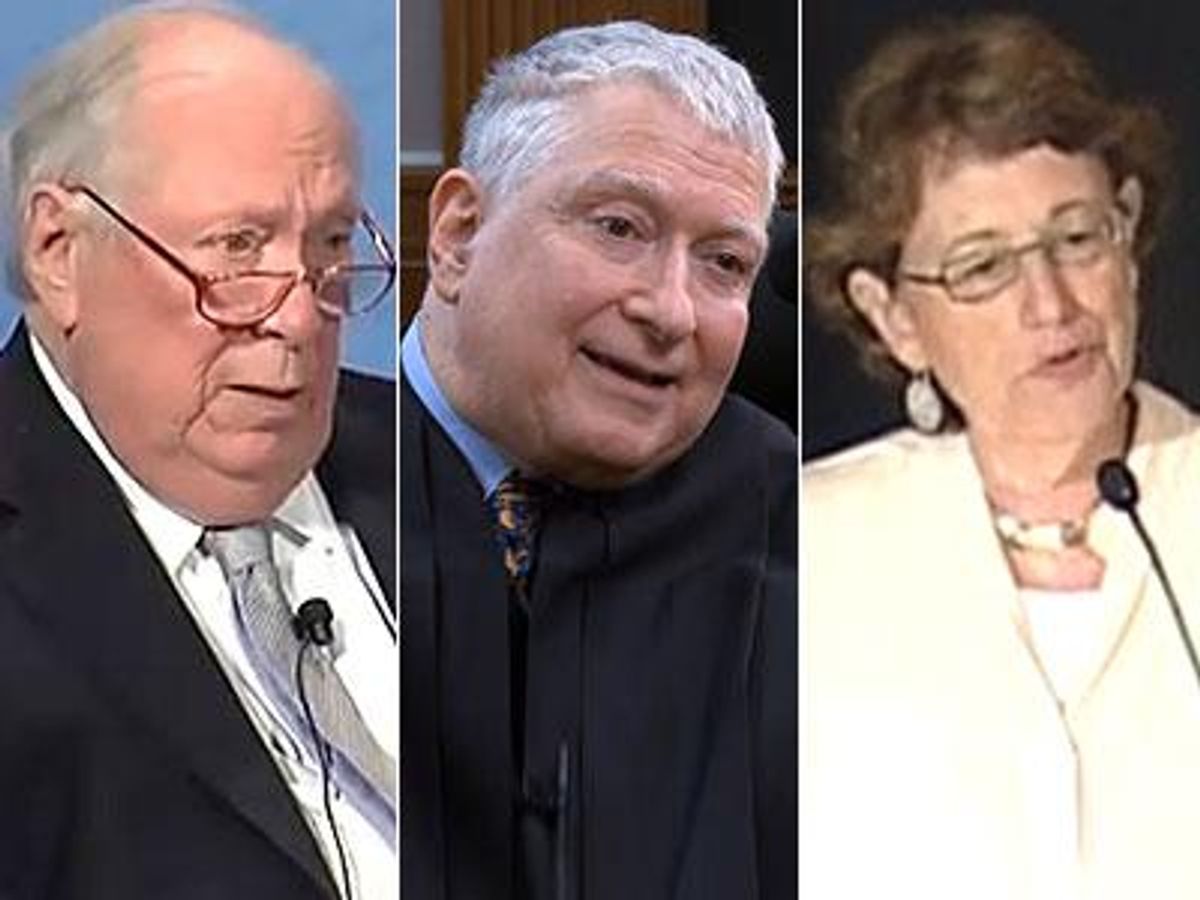It's impossible to predict exactly how a court will rule, but on Monday a three-judge panel at the Ninth Circuit Court of Appeals gave every indication that they'll strike down same-sex marriage bans across the western states.
The court heard appeals in cases involving Idaho, where a U.S. district court has struck down such a ban; Nevada, where the ban has been upheld; and Hawaii, which has enacted marriage equality through legislation, so the appeals court is being asked to dismiss a case rendered moot by that action.
The line of questioning from the judges made it clear that they are highly skeptical of antigay arguments and also hinted at the reasoning that the judges will use to uphold the rulings against Idaho and Nevada's bans.
Judges Stephen Reinhardt, Ronald M. Gould, and Marsha S. Berzon heard the arguments, and all three have a strong track record with LGBT cases. Reinhardt ruled that Proposition 8 was unconstitutional, Gould authored a favorable ruling in a case involving "don't ask, don't tell," and Berzon joined with Reinhardt in a ruling that improved the standard of review for cases involving LGBT discrimination.
The case involving standards of review will likely have an important impact on the marriage cases. In a 2012 ruling, a Nevada court upheld a marriage ban using the relatively permissive "rational basis" standard. But following that ruling, the Ninth Circuit held in a separate case that anti-LGBT discrimination must be subjected to "heightened scrutiny." That prompted Nevada state attorneys to drop their defense of the ban, explaining that the improved standard of review would cause them to lose.
During Monday's arguments, the judges indicated that they would examine the marriage bans under heightened scrutiny. Berzon went even further, suggesting that the laws amounted to discrimination on the basis of gender.
Lambda Legal attorney Tara Borelli, representing Nevada couples, argued that the state's law would fail under any basis, whether strict scrutiny or rational basis. Reinhardt appeared to agree that heightened scrutiny was warranted, saying, "It would seem that way."
Representing the antigay Coalition for the Protection of Marriage, Idaho attorney Monte Stewart, who is defending both the Nevada and Idaho laws, countered that rational basis should apply, since he claimed the laws were not enacted out of animus.
But Stewart seemed to undermine his own argument when he displayed a poster from the Idaho campaign to ban same-sex marriage. The poster featured a child with her parents, with a caption rhetorically asking whether gay and lesbian couples would render a father or mother unnecessary.
Deborah Ferguson, representing the Idaho plaintiffs, pointed out that Idaho is sending a "powerful message" to its residents, particularly to children, about the perceived quality of LGBT parenting. "That message is Idaho's refusal to allow their parents to marry, to have their legal marriages recognized, or in fact, refusal [to recognize] any form of relationship tells those children that their parents' marriages are not worthy of respect and acknowledgement," she said.
Ferguson also argued that the laws caused tangible harm, from areas "as mundane as paying taxes" to property rights and inheritance. She also pointed out that Idaho's ban prevents couples from even obtaining a civil union. "The law imposes a cradle-to-grave discrimination on same-sex couples in Idaho," she said.
Stewart could offer only weak, vague justification for the laws, with which the judges grew increasingly impatient. He argued that if gay and lesbian parents could marry, "the men socialized by that new and different marriage institution will weaken in their commitment to abide by the child's bonding norm."
Judge Berzon responded, "Has that happened in Massachusetts? ... My understanding is no."
The judges were also skeptical of the terminology Stewart employed. He referred to "genderless marriage" and the "bonding right" of children. Gould pressed Stewart on the origin of the term "bonding right," and he confessed that he had made it up.
Stewart also appeared nervous and unprepared, frequently pausing, forgetting details, and twice referring to Idaho when he meant Nevada. When corrected, he said, "This is a lesson to all counsel not to do back-to-back arguments."
The judges were clearly unconvinced by Stewart. "What about divorce -- does Idaho prohibit divorce because it sends a bad message?" Reinhardt asked.
Berzon pointed out that family structures have been in a state of change long before the question of same-sex marriage came up.
"What strikes me is that this train has left the station," she said, "in the sense that the change has occurred in American marriages before all this. ... Once all of that changed, yes, the number of people who had children in marriage went down considerably, and that may be a bad thing, but it did not have anything to do with this."
A favorable ruling is likely to come from the Ninth Circuit sometime in the next few weeks, or possibly months. From there, parties would likely petition the U.S. Supreme Court, though it's anyone's guess whether the court would take the case. But one way or another, it's all but guaranteed that the Supreme Court will take at least one marriage case in its next term.
"I think," Reinhardt predicted at one point, "you're going to have an opportunity to find out what Justice Kennedy thinks."

















































































Viral post saying Republicans 'have two daddies now' has MAGA hot and bothered